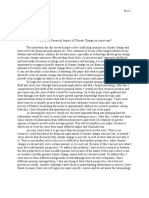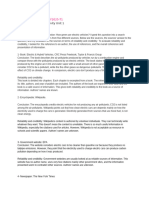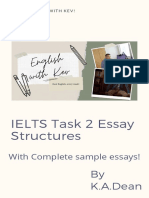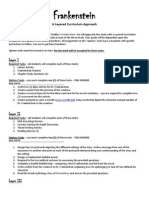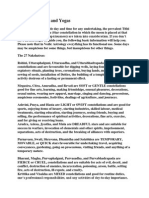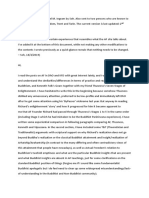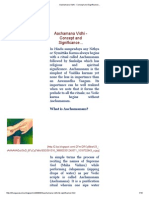0 ratings0% found this document useful (0 votes)
40 viewsAnalysis Essay (SFA)
Analysis Essay (SFA)
Uploaded by
saihtookhantkyaw22The document analyzes two articles about Daylight Saving Time (DST) that present arguments from both supporters and critics. The analysis finds that Article 2 provides stronger and more reliable evidence than Article 1. Article 2 cites more specific, credible studies conducted as recently as 2007 in California, while Article 1 references older, more general studies from the 1970s without details. Article 2 also discusses updated traffic studies from three sources, whereas Article 1 claims DST saves lives without factual support. Overall, Article 2 makes stronger arguments through credible, detailed evidence compared to the general claims and outdated research referenced in Article 1.
Copyright:
© All Rights Reserved
Available Formats
Download as DOCX, PDF, TXT or read online from Scribd
Analysis Essay (SFA)
Analysis Essay (SFA)
Uploaded by
saihtookhantkyaw220 ratings0% found this document useful (0 votes)
40 views1 pageThe document analyzes two articles about Daylight Saving Time (DST) that present arguments from both supporters and critics. The analysis finds that Article 2 provides stronger and more reliable evidence than Article 1. Article 2 cites more specific, credible studies conducted as recently as 2007 in California, while Article 1 references older, more general studies from the 1970s without details. Article 2 also discusses updated traffic studies from three sources, whereas Article 1 claims DST saves lives without factual support. Overall, Article 2 makes stronger arguments through credible, detailed evidence compared to the general claims and outdated research referenced in Article 1.
Copyright
© © All Rights Reserved
Available Formats
DOCX, PDF, TXT or read online from Scribd
Share this document
Did you find this document useful?
Is this content inappropriate?
The document analyzes two articles about Daylight Saving Time (DST) that present arguments from both supporters and critics. The analysis finds that Article 2 provides stronger and more reliable evidence than Article 1. Article 2 cites more specific, credible studies conducted as recently as 2007 in California, while Article 1 references older, more general studies from the 1970s without details. Article 2 also discusses updated traffic studies from three sources, whereas Article 1 claims DST saves lives without factual support. Overall, Article 2 makes stronger arguments through credible, detailed evidence compared to the general claims and outdated research referenced in Article 1.
Copyright:
© All Rights Reserved
Available Formats
Download as DOCX, PDF, TXT or read online from Scribd
Download as docx, pdf, or txt
0 ratings0% found this document useful (0 votes)
40 views1 pageAnalysis Essay (SFA)
Analysis Essay (SFA)
Uploaded by
saihtookhantkyaw22The document analyzes two articles about Daylight Saving Time (DST) that present arguments from both supporters and critics. The analysis finds that Article 2 provides stronger and more reliable evidence than Article 1. Article 2 cites more specific, credible studies conducted as recently as 2007 in California, while Article 1 references older, more general studies from the 1970s without details. Article 2 also discusses updated traffic studies from three sources, whereas Article 1 claims DST saves lives without factual support. Overall, Article 2 makes stronger arguments through credible, detailed evidence compared to the general claims and outdated research referenced in Article 1.
Copyright:
© All Rights Reserved
Available Formats
Download as DOCX, PDF, TXT or read online from Scribd
Download as docx, pdf, or txt
You are on page 1of 1
Analysis Essay
Sayar Chong Min
Phyo Lin Kyaw
3.14.2024
The articles provide a comprehensive examination of Daylight Saving Time
(DST), covering its historical origins in the United States, perceived benefits, and
criticisms. Both supporters and critics of DST effectively present arguments,
historical contexts, research studies, and practical considerations. However, in my
point of view, the article from critics of DST seems more acceptable and reliable
according to these points.
First, the articles start with their views on energy consumption and DST. Both
articles mentioned the pros and cons of DST when it comes to energy usage and
both mentioned studies and researches to support their evidence. However, in article
1, the sentence “DST saved about 1% per day in energy costs” seems to support the
evidence but the study that the writer mentioned in this article was very general and
outdated since it took place in the 1970s. The points look very interesting but there
are no specifics. On the other hand, specific sources and studies are mentioned in
article 2. In article 2, the sentence “A2007 study in California indicated that DST had
little or no effect on energy consumption that year” makes the evidence stronger.
The study is very specific as the place where the study was done and the name of
the study are mentioned. In that sentence, the word “that year” makes the study
updated. What’s more, the second study seems more specific than that in article 1.
Second, the articles continued to discuss car accidents and road safety
related to DST. In article 1, personally speaking, the claims are not sufficient to
support the evidence because the sentence “Supporters of DST also claim that more
sunlight saves lives” is an opinion not fact. Although three decades of research is
mentioned to support the claim, I think it is a bit unnecessary because the time in
which the research has been done is so long. Despite these researches, the points
that the author adds are interesting and acceptable. In article 2, three studies are
mentioned, all of them seem reliable and updated and the points are acceptable as
well.
Third, authors added their opinions in the last paragraph to make their claims
stronger. However, article 1 mentioned another study to make the argument more
acceptable but as usual, the study seems very general and there is no credibility.
Overall, the points that are made by the author of article 2 are stronger and
more reliable than that of article 1. Because of specific details, updated studies and
reliable facts make the article 2 better.
You might also like
- Article Review SampleDocument7 pagesArticle Review SampleMatin Ahmad Khan82% (11)
- Fear Not - Be StrongDocument17 pagesFear Not - Be StrongAayushi_ch54% (52)
- Assignments Samples CritiqueDocument31 pagesAssignments Samples CritiqueNadzirah RozaimiNo ratings yet
- 1261109Document440 pages1261109BencivenneDallaChitarra0% (1)
- Structuralism: PoststructuralismDocument2 pagesStructuralism: PoststructuralismM.ZubairNo ratings yet
- Undergraduate Advanced Diploma in English Literature (Course Specification)Document18 pagesUndergraduate Advanced Diploma in English Literature (Course Specification)Holly Maria CassonNo ratings yet
- Annotated-Bio142 20preposal 20reflectionDocument2 pagesAnnotated-Bio142 20preposal 20reflectionapi-331864368No ratings yet
- Extended Response 6 ADocument11 pagesExtended Response 6 A12-057 MOHAMMAD MUSHFIQUR RAHMANNo ratings yet
- Argumentative Essay Writing A Step-by-Step GuideDocument18 pagesArgumentative Essay Writing A Step-by-Step Guidems cheng100% (1)
- Extended Response 5 ADocument13 pagesExtended Response 5 A12-057 MOHAMMAD MUSHFIQUR RAHMANNo ratings yet
- Example Rept 1jDocument4 pagesExample Rept 1jfruittinglesNo ratings yet
- Analyzing Arguments StudentsDocument29 pagesAnalyzing Arguments StudentsqueengielinNo ratings yet
- Identifying and Analyzing ArgumentsDocument3 pagesIdentifying and Analyzing ArgumentsYajeev Baldo NojatonNo ratings yet
- Global Perspectives and ResearchDocument27 pagesGlobal Perspectives and ResearchManahyl AzizNo ratings yet
- LECTURE 5 - Supporting SentencesDocument9 pagesLECTURE 5 - Supporting SentencesHoàng TrungNo ratings yet
- Research Methods ExamIDocument15 pagesResearch Methods ExamITomlucaNo ratings yet
- Identifying ArgumentsDocument2 pagesIdentifying Arguments14josephfrank14No ratings yet
- Research DossierDocument9 pagesResearch Dossierapi-488977363No ratings yet
- Prae Writing PatternDocument5 pagesPrae Writing PatternPhranakorn TutorsNo ratings yet
- Plagiarism - ZINEB KESSASSIDocument5 pagesPlagiarism - ZINEB KESSASSIblue lila100% (1)
- Identifying and Analyzing Arguments: Page 1 of 5Document5 pagesIdentifying and Analyzing Arguments: Page 1 of 5RYQUE A100% (1)
- Identifyingarguments PDFDocument5 pagesIdentifyingarguments PDFLiezel Gajutos SaldoNo ratings yet
- Thesis FormatDocument11 pagesThesis FormatAna Rhea Padillo PleñosNo ratings yet
- Assignment 1Document5 pagesAssignment 1Teoh Wong WeiNo ratings yet
- Compare and Contrast EssayDocument32 pagesCompare and Contrast Essayalun afrianNo ratings yet
- CEL2103 Lecture Notes 3Document14 pagesCEL2103 Lecture Notes 3mabmi17No ratings yet
- uni1Document2 pagesuni1moemakhlouf6No ratings yet
- CSC Writing ArgumentsDocument25 pagesCSC Writing ArgumentsJaniceWillsonNo ratings yet
- Final Lexi CologyDocument29 pagesFinal Lexi CologyVũ Thủy TiênNo ratings yet
- "Doing Research" - Understanding The Different Types of Peer-Reviewed Articles Rockford Sansom - Linklater - ForschungDocument7 pages"Doing Research" - Understanding The Different Types of Peer-Reviewed Articles Rockford Sansom - Linklater - ForschungWinter HeinzNo ratings yet
- Relationship Between Urban Sprawl and Physical Activity, Obesity, and MorbidityDocument3 pagesRelationship Between Urban Sprawl and Physical Activity, Obesity, and MorbidityrinalNo ratings yet
- Source Evaluation-2Document12 pagesSource Evaluation-2api-667570022No ratings yet
- Language Arts Extended Response ItemDocument3 pagesLanguage Arts Extended Response Itemapi-254570119100% (1)
- Essay Structure Book New EditionDocument20 pagesEssay Structure Book New EditionKevinAnthonyDeanNo ratings yet
- Term Limits_ Causes and ConsequencesDocument55 pagesTerm Limits_ Causes and ConsequencesTyler CookNo ratings yet
- Cross Text Bài Dạy 2Document26 pagesCross Text Bài Dạy 2giahuy230713No ratings yet
- Annotated Bibliography-Alternative Energy Alexandra Dawson 11-01-15 Professor Fielding WRTCDocument9 pagesAnnotated Bibliography-Alternative Energy Alexandra Dawson 11-01-15 Professor Fielding WRTCapi-296678363No ratings yet
- Pay For PlayDocument4 pagesPay For Playapi-297933318No ratings yet
- Research TopicDocument3 pagesResearch TopicMarissa AdraincemNo ratings yet
- Wk1 How To Write A ParagraphDocument24 pagesWk1 How To Write A ParagraphcjmmclyNo ratings yet
- Examiner - S Report 2015-2016Document5 pagesExaminer - S Report 2015-2016Jess HoNo ratings yet
- Student Handout - Conclusion TasksDocument3 pagesStudent Handout - Conclusion Tasksbibosynova02No ratings yet
- Week 7 Structuring The Paragraphs (Part 2)Document14 pagesWeek 7 Structuring The Paragraphs (Part 2)Harsha Somaraju100% (1)
- CitationProximity Analysis (CPA)Document5 pagesCitationProximity Analysis (CPA)Jenny JiouNo ratings yet
- Work Sheet 1Document3 pagesWork Sheet 1api-666449147No ratings yet
- Term Project PaperDocument6 pagesTerm Project Paperapi-302468525No ratings yet
- ArgumentsDocument15 pagesArgumentsLoev Mei NahtNo ratings yet
- Major Concerns: Microfinance On The Income of Borrowers in Khyber Pakhtunkhwa: A Case Study of Khuashali Bank" byDocument3 pagesMajor Concerns: Microfinance On The Income of Borrowers in Khyber Pakhtunkhwa: A Case Study of Khuashali Bank" bysami mughalNo ratings yet
- Guide Lines For Research Proposal and Report WritingDocument34 pagesGuide Lines For Research Proposal and Report WritingFatuma HusseinNo ratings yet
- Arguments, Premises, and Conclusions.: LogicDocument5 pagesArguments, Premises, and Conclusions.: LogicEng Mohamed OsmanNo ratings yet
- Types of ClaimsDocument3 pagesTypes of ClaimsIvy EscarlanNo ratings yet
- Research Utilization Custom EssayDocument3 pagesResearch Utilization Custom Essayoliver lando0% (1)
- Essay Writing HandoutDocument44 pagesEssay Writing HandoutDian RamadhaniNo ratings yet
- Ila4 - HealthcareDocument3 pagesIla4 - Healthcareapi-354415602No ratings yet
- Inq Wehrenberg MDocument1 pageInq Wehrenberg Mapi-302837296No ratings yet
- Creating Topic Sentences, Supporting Sentences and Concluding SentencespdgDocument6 pagesCreating Topic Sentences, Supporting Sentences and Concluding SentencespdgInam UllahNo ratings yet
- Questions 1 To 3 Are Based On The Following TextDocument10 pagesQuestions 1 To 3 Are Based On The Following TextartosNo ratings yet
- Research Dossier Revised Final DraftDocument11 pagesResearch Dossier Revised Final Draftapi-548825228No ratings yet
- Gen600final TW Jan 2017 1 Solution GuidelinesDocument8 pagesGen600final TW Jan 2017 1 Solution GuidelinesAmr MohamedNo ratings yet
- WP Reverse OutlineDocument3 pagesWP Reverse Outlineapi-302157262No ratings yet
- Essay GedDocument4 pagesEssay Gedadkmelii06No ratings yet
- Engl 1302 Annotated Bib Reflection EssayDocument4 pagesEngl 1302 Annotated Bib Reflection Essayapi-740918102No ratings yet
- Scientific Integrity and Ethics in the GeosciencesFrom EverandScientific Integrity and Ethics in the GeosciencesLinda C. GundersenNo ratings yet
- The Supplement to A Legal Guide for Student Affairs ProfessionalsFrom EverandThe Supplement to A Legal Guide for Student Affairs ProfessionalsNo ratings yet
- Cellular Automata: An Introduction: Gustavo Camelo NetoDocument24 pagesCellular Automata: An Introduction: Gustavo Camelo NetoGutemberg AlvesNo ratings yet
- Frankenstein Layered CurriculumDocument2 pagesFrankenstein Layered CurriculumbuiecNo ratings yet
- Desain Bahan Ajar Penjumlahan Pecahan Berbasispendidikan Matematika Realistik Indonesia (Pmri) Untuk Siswa Kelas Iv Sekolah Dasar Negeri 23 IndralayaDocument11 pagesDesain Bahan Ajar Penjumlahan Pecahan Berbasispendidikan Matematika Realistik Indonesia (Pmri) Untuk Siswa Kelas Iv Sekolah Dasar Negeri 23 IndralayaYulia Utami PutriNo ratings yet
- Chain RuleDocument8 pagesChain RuletxungoNo ratings yet
- Professor Resignation Letter TemplatesDocument2 pagesProfessor Resignation Letter TemplatesDickdick MaulanaNo ratings yet
- Logical Intuitive ExtratimDocument3 pagesLogical Intuitive ExtratimcringeNo ratings yet
- Naksatras, Tithis and YogasDocument6 pagesNaksatras, Tithis and Yogaskamaraj8@rediffmail.comNo ratings yet
- Mgt111 (Introduction To Public Administration) : Mid Term ExaminationDocument5 pagesMgt111 (Introduction To Public Administration) : Mid Term ExaminationRashid JalalNo ratings yet
- Poetry Analysis-Lesson 6 (23 April 2021)Document26 pagesPoetry Analysis-Lesson 6 (23 April 2021)Zainal AthoNo ratings yet
- 15EC36 Engineering Electromagnetics PDFDocument7 pages15EC36 Engineering Electromagnetics PDFThriwha100% (1)
- North West Passage Lesson - Jonathan RandallDocument3 pagesNorth West Passage Lesson - Jonathan Randallapi-215370190No ratings yet
- Curricular Annual Plan "2 de Mayo" School: Foreign Language Lcda. Ibel OrellanaDocument16 pagesCurricular Annual Plan "2 de Mayo" School: Foreign Language Lcda. Ibel OrellanaIbel OrellanaNo ratings yet
- Proof by Contrapositive, Contradiction: 1 AnnouncementsDocument6 pagesProof by Contrapositive, Contradiction: 1 AnnouncementsScherzo LinNo ratings yet
- Change Management EssayDocument5 pagesChange Management EssayAvinashNo ratings yet
- Lesson 2 FeedbackDocument6 pagesLesson 2 Feedbackapi-267744702No ratings yet
- Actual Freedom and BuddhismDocument106 pagesActual Freedom and BuddhismxabirNo ratings yet
- Comment ServletDocument216 pagesComment Servletdrtmmm5No ratings yet
- I Can Ask For and Provide Personal Information in A Brief ConversationDocument2 pagesI Can Ask For and Provide Personal Information in A Brief ConversationTreysi Padin LazaroNo ratings yet
- Sri Radha Ramanji of VrindavanDocument4 pagesSri Radha Ramanji of VrindavanRamana Pingili (Yamuna Jivan Das)100% (1)
- Prijemni 2005Document8 pagesPrijemni 2005segy2No ratings yet
- Sample of Lesson Plan Using Needham's Five Phase Constructivist ModelDocument7 pagesSample of Lesson Plan Using Needham's Five Phase Constructivist ModelJamie OngNo ratings yet
- Lesson Plan 123 - Copy - Doc 123Document11 pagesLesson Plan 123 - Copy - Doc 123abegailpelias11No ratings yet
- CCN BookDocument20 pagesCCN BookAntonius Dennis TNo ratings yet
- AntiChristian Polemic in Early Islam A Translation and Analysis of Ab - Uthm-N Amr B. Ba-R AlJ - I-S Ris-La Radd Al - AlNa - R - A Reply To The ChristiansDocument148 pagesAntiChristian Polemic in Early Islam A Translation and Analysis of Ab - Uthm-N Amr B. Ba-R AlJ - I-S Ris-La Radd Al - AlNa - R - A Reply To The Christiansnoornoor8No ratings yet
- Aachamana Vidhi - Concept and Significance..Document19 pagesAachamana Vidhi - Concept and Significance..Puvvada Raambaabu100% (1)
- Rupesh R.K Babu: Phone 0474 2532271 Mobile 9633262415Document3 pagesRupesh R.K Babu: Phone 0474 2532271 Mobile 9633262415Anonymous KyLhn6No ratings yet

















